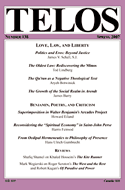As an occasional feature on TELOSscope, we highlight a past Telos article whose critical insights continue to illuminate our thinking and challenge our assumptions. Today, Laura Groenendaal looks at Hans Ulrich Gumbrecht’s “From Oedipal Hermeneutics to a Philosophy of Presence,” from Telos 138 (Spring 2007).
In his article “From Oedipal Hermeneutics to a Philosophy of Presence,” Hans Ulrich Gumbrecht responds to a colloquium’s debate on whether “academic heresy” can produce “revolutions within the humanities” by rejecting its language:
I see the humanities as a cluster of disciplines that continuously shifts and, by shifting, transforms itself—mostly (but not always) without any programmatic direction, and sometimes stirring up sudden splashes, waves, and even tsunamis in the formless ocean of the public sphere. If anything, such splashes, waves, and tsunamis follow (and here I am producing my own metaphorical contradiction) an emotional “logic” of family romances and oedipal revolts, rather than the institutional logic of heresies and revolutions.
 In moving away from an institutional framework for the humanities, Gumbrecht’s account relies upon Harold Bloom’s genre of family romance. In Bloom’s narrative, the discipline evolves because every generation is engaged in Oedipal revolt against its immediate predecessor. The weaker “sons” of a rising generation can come to their own only by attacking their stronger intellectual “fathers.” Revolt is concerned with generational rather than institutional paradigms; not political, religious, cultural totalitarianisms in themselves until they align with the petty totalitarianism of the Father. Transformations within the humanities are self-generated, driven organically by the demand for unconditional discontinuity.
In moving away from an institutional framework for the humanities, Gumbrecht’s account relies upon Harold Bloom’s genre of family romance. In Bloom’s narrative, the discipline evolves because every generation is engaged in Oedipal revolt against its immediate predecessor. The weaker “sons” of a rising generation can come to their own only by attacking their stronger intellectual “fathers.” Revolt is concerned with generational rather than institutional paradigms; not political, religious, cultural totalitarianisms in themselves until they align with the petty totalitarianism of the Father. Transformations within the humanities are self-generated, driven organically by the demand for unconditional discontinuity.
As testimony, Gumbrecht traces Oedipal logic throughout his own intellectual genealogy. In an “autobiographical fantasy,” he re-imagines the relationships between his academic influences as a family tree. Husserl is drawn as patriarch. Heidegger, his chosen successor at Freiburg, famously abandons this intellectual father after the 1933 racial laws stripped Husserl of his academic standing. Heidegger is in turn abandoned by Hans-Georg Gadamer, his greatest student, upon Heidegger’s courting of the Nazi party. “Grandfather” Gadamer’s relations with his own student, Gumbrecht’s “father” Hans Robert Jauss, are fraught with contempt. Finally it is Gumbrecht who must reject Jauss, the academic advisor whose prestige (as the most widely read author within the direction of literary studies grouped as “aesthetics of reception”) launched his career. With these neatly simplified biographies he rehearses the non-institutional drivers of the humanities. Gumbrecht’s account of his own career is structured around the negation of Jauss, defined by the mythology of the latter’s presence.
Yet Gumbrecht is concerned with transcending this familial model of subjectivation. He recognizes Oedipal hermeneutics as infantilizing, rendering intellectual life wholly dependent upon the preceding generation as a point of reference and bounding innovation to a symmetrical negation. What happens when there is no father strong enough to wound? Would post-Soviet Russia then be condemned to an intellectual vacuum? Even where one exists, the logic of family romance means that each generation’s desperation to weaken its predecessor decays intellectual quality devastatingly over time. Gumbrecht credits his own escape to his recent project on the “Production of Presence”—and yet recognizes its debt to “great-grandfather” Heidegger. He suggests that if we cannot escape our fathers, the future of the humanities may rest upon the imperative to surpass them.
Read the full version of Hans Ulrich Gumbrecht’s “From Oedipal Hermeneutics to a Philosophy of Presence” at the TELOS Online website. If you are affiliated with an institution that is an online subscriber to Telos, you have free access to our complete online archive. If not, you can purchase 24-hour access to this and other Telos articles at the low rate of $10/article.








